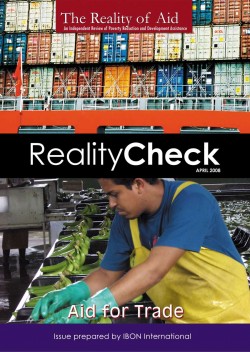About the Issue
“Aid-for-trade” (AfT) is the catch-all term for trade-related official development assistance (ODA) provided to developing countries. With the Doha Round in the doldrums, Aid-for-trade is gaining even more prominence within official aid and trade circles. Proponents basically share three common premises that provide the rationale for Aid-for-trade: (1) that trade is beneficial to developing countries; (2) that developing countries may face costs and other constraints that prevent them from fully benefiting from trade; and (3) that aid can offset these costs and constraints, hence, enable these countries to benefit significantly from trade. Despite this ostensibly laudable objective, the Aid-for-trade agenda merits a closer and more critical examination from the perspective of people-centered development.
Contents
- A critical look at aid-for-trade
- Examining the EU-ACP economic partnership agreements
- Aid for trade: Bonanza for consultants, nothing for development
- Statement: Global aid for trade review
Acknowledgements
This Reality Check was made possible with valuable contributions from Paul Quintos. Gratitude must also be extended to the Centre for Trade and Development (CENTAD) and Aldo Caliari of the Centre of Concern.
Cover Photos by:
Michael Salamon
Jonathan Pio
Inside Photos by:
Curt Carnemark/World Bank
Arne Hoel/World Bank
Adam Rogers/UNCDF
Cover Design and Layout by: Florenio Bambao

